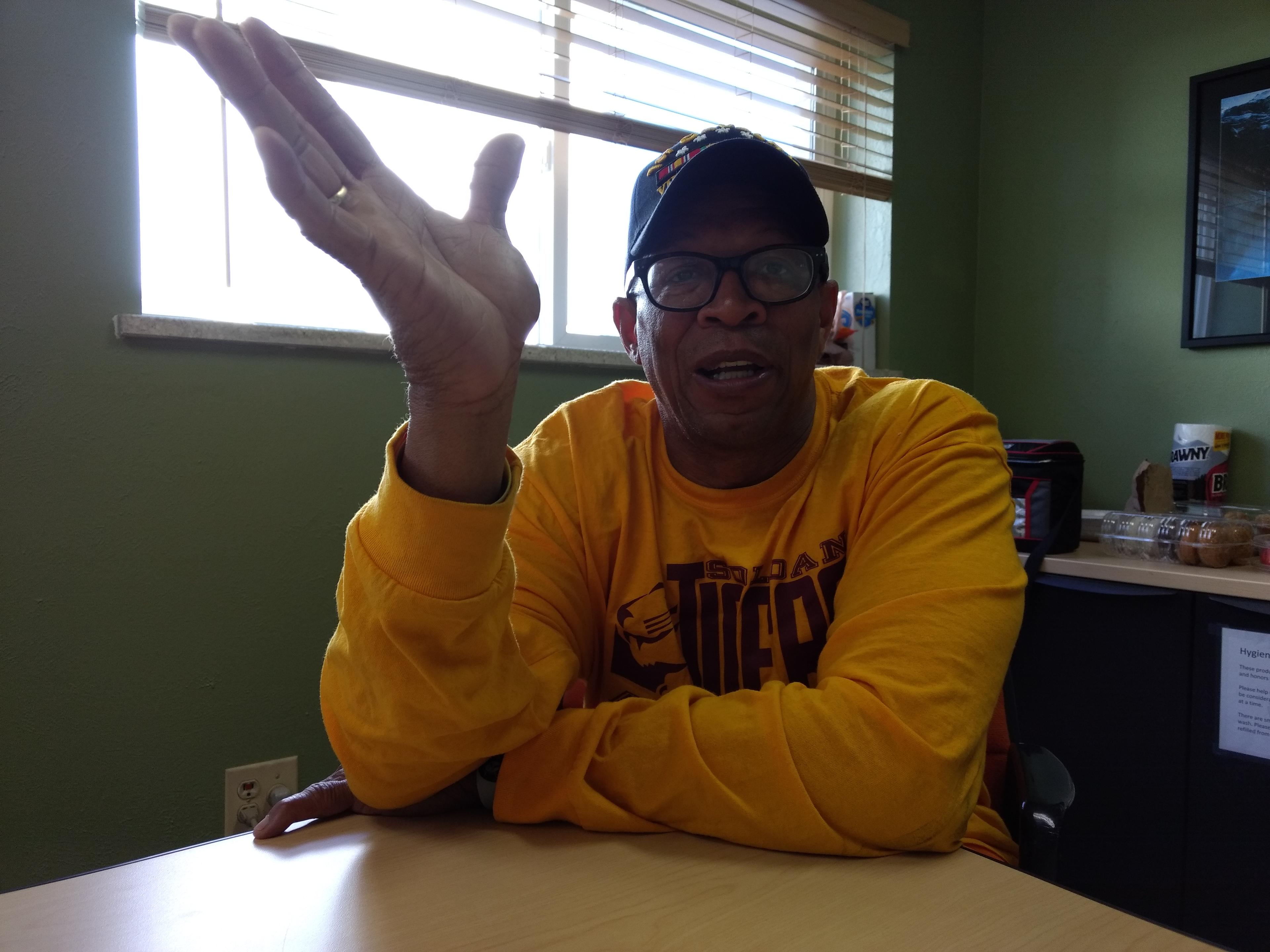Perhaps the volunteers sprucing up the Colorado Coalition for the Homeless facility for veterans were putting out vibes of optimism.
Or perhaps, as Vietnam vet and retired teacher and coach Lamont M. Shannon says, it's because pessimism is not his nature.
Whatever the reason, he was hoping to move to permanent housing by Christmas, leaving the studio in a transitional housing facility that has been his home since May 2017. Shannon had recently learned he was sixth on the waiting list for an affordable housing complex for seniors in Montbello, the neighborhood where he once lived and taught.
"I imagine if I didn't have that religious conviction, I would feel sorry for myself, drown in my miseries," said Shannon, an energetic 66-year-old who also is an ordained minister. "But that's not in my character."
Victory House on a leafy street in Uptown provides transitional housing and mental health and other support for people experiencing homelessness, especially homeless veterans.
The point-in-time survey, taken earlier this year in an annual attempt to understand the problem, found 427 veterans on Denver streets. That was 12 percent of the 3,445 people who were experiencing homelessness on Jan. 29. Nationally, according to the most recent annual point-in-time survey released by the Department of Housing and Urban Development, 40,056 veterans were homeless in the United States, just over nine percent of all homeless adults.
Nicole Miera, a veterans housing specialist for the Colorado Coalition for the Homeless, said the goal is to get residents out of Victory House's eight studios and four one-bedrooms into permanent housing within two years. She said that has become more difficult as housing prices climbed in Denver. In the past, veterans and other residents would have a few months to settle in at Victory House. Now, Miera gets them started helping with their house-hunting immediately. They also have to pledge to stay off drugs and alcohol and find ways to participate in their community.
Many Victory House residents have come straight from the streets on referrals from Veterans Affairs. Shannon came close to homelessness when he realized he was going to lose the Montbello basement apartment where he had been staying while caring for his frail landlord. The landlord's family was moving back from out of state. Shannon couldn't afford a market-rate apartment.
"I called the VA and explained to them that in two weeks I would be homeless," he said. "When the bottom falls out, you're looking to see if there's a lifeline that you can grab hold of."
Shannon will acknowledge only that it is "humbling" to be in need of help to find a home. But he said moving into Victory House had forced him to confront PTSD that dates from his Vietnam experiences as a field medic. Since moving to the transitional project he has been given a diagnosis and awarded disability benefits.
"You cannot have been in anybody's war and not have something," he said. "I'm sure there are a lot of homeless vets out there who don't known about these programs."
The Missouri native went to school on the GI Bill almost as soon as he returned from Vietnam in 1973, earning a bachelor's in journalism and a master's in history from Lincoln University in Jefferson City, Mo. In 1983 he came to Denver, where he taught social studies and math and coached at Martin Luther King Middle School and Manuel, Montbello and Thomas Jefferson high schools and the Love Christian Fellowship church school. Swimming was his speciality, but he's also coached basketball.
Shannon said he had always dealt with trauma by keeping busy and never missed work because of illness. These days he's the volunteer coach for a step team at Florida Pitt Waller Elementary School. He teaches Sunday school at a nearby church and records a weekly video sermon for another church. He cycles from Victory House to the nearby Carla Madison Recreation Center to lift weights five times a week and swim twice.
He's hoping his Montbello apartment will have space for a weight room. He praises Miera, the veterans housing specialist, for helping him find a home.
Miera said Victory House residents are screened to ensure they are ready to work to stay housed and to be part of their community.
She looks for apartments renting for under $1,000 a month. She can steer clients toward property managers with whom she has worked before and who understand her mission.
"You say veteran and people, they want to do their duty in helping those that have served us," Miera said.

Joe Lundy, himself a veteran, has come to Miera's aid the past three years as part of a volunteer team from Lockheed Martin that arrives annually to help maintain Victory House. Last year, Lundy and his co-workers also fixed up and painted a community room in the basement. Last week, he and a team painted, organized the donation closet and cleared out the garden.
Lundy retired from Buckley in 2004 after 21 years in the Air Force and has since been with Lockheed, which directs much of its philanthropy to veterans. Lundy lives in Aurora and said he has seen the growing homelessness problem in metro Denver.
"Being military, my heart's with the vets and the military," he said.
Correction: An earlier version mischaracterized the work the Lockheed Martin team did at Victory House last year. The volunteers fixed up and painted a community room.














